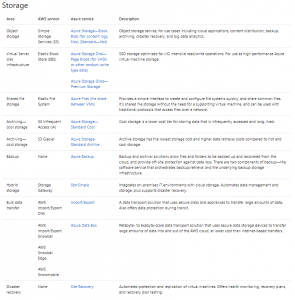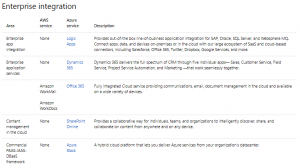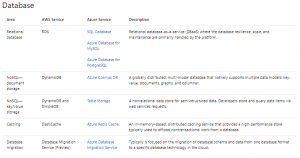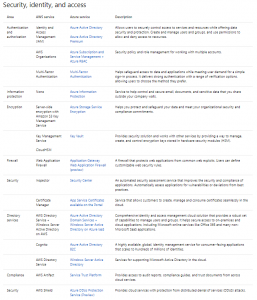
Amazon AWS versus Microsoft Azure: Which is best for your business?
Owning and running a business is already a major challenge in your working career, but finding the best cloud storage for your business is even more challenging. To determine the best cloud computing service for your business, you must take multiple factors in consideration such as, storage, enterprise, computing, database, security and pricing.
This article will help you decide and will serve as a guide in assessing a cloud computing service that will suit your business needs.
STORAGE
AWS storage includes its Simple Storage (S3), Elastic Block Storage (EBS), Elastic File System (EFS), import/export large volume data transfer service, Glacier archive backup, and Storage Gateway, which integrates with on-premises environments.
Microsoft’s offerings include its core Azure Storage service, Azure Blob block storage, as well as Table, Queue, and File storage. It also offers Site Recovery, Import Export, and Azure Backup.
The following table shows storage comparison of AWS and Azure.
ENTERPRISE INTEGRATION
Microsoft Azure clearly dominates cloud enterprise integration service. Azure has Logic Apps, which is a cloud-based connector for applications, data and devices. Microsoft also has Dynamics 365, an end-to-end application in cloud and SharePoint a collaborative platform that integrates Microsoft Office applications.
The table illustrates enterprise service for both AWS and Azure
COMPUTING
In computing, Amazon AWS and Microsoft Azure offers largely similar capabilities of serverless computing.
AWS offers Elastic Compute (EC2) instances that can be tailored by a large number of options. Related services include Elastic Beanstalk for app deployment and the EC2 Container service. Azure’s compute offering is centered around its Virtual Machines (VMs), with other tools such as Cloud Services and Resource Manager to help deploy applications on the cloud, and its Azure Autoscaling service.
DATABASE
Both providers offer robust relational-database-as-a-service features with AWS’s RDS (Relational Database Service) and Azure’s SQL Database. Each also offers NoSQL databases (Azure DocumentDB and Amazon DynamoDB). Comparing database services of AWS vs. Azure, AWS offers more options and more finely grained control, while Azure database services are easier to use. That aspect can point a business to which provider to use for specific parts of their cloud strategy.
SECURITY
AWS and Azure both have exceptional security on their clouds and offers on-premises active directory integration, control over who can add/remove users, control over who can create/destroy/edit resources, and government clouds and government-friendly cloud regions
PRICING
Establishing a data centre is expensive and purchasing and hiring technicians to install and manage this equipment can be very costly. When you move to cloud, you will only pay the services procured. Cloud services offers set of tools that will help you to cope with data computing, storing and analysing.
WHICH IS BETTER FOR YOUR BUSINESS?
A head-to-head comparison of Azure and AWS will indicate minor differences in tools and approach for their end users but both are great choices for almost any business. Choosing the best cloud service provider is tough but the one that meets your expectations and the needs of your business will always be the best choice.
Confused which cloud provider best suit your business needs? Get in touch with our IT experts today at 1300 337 984.
Sources:





